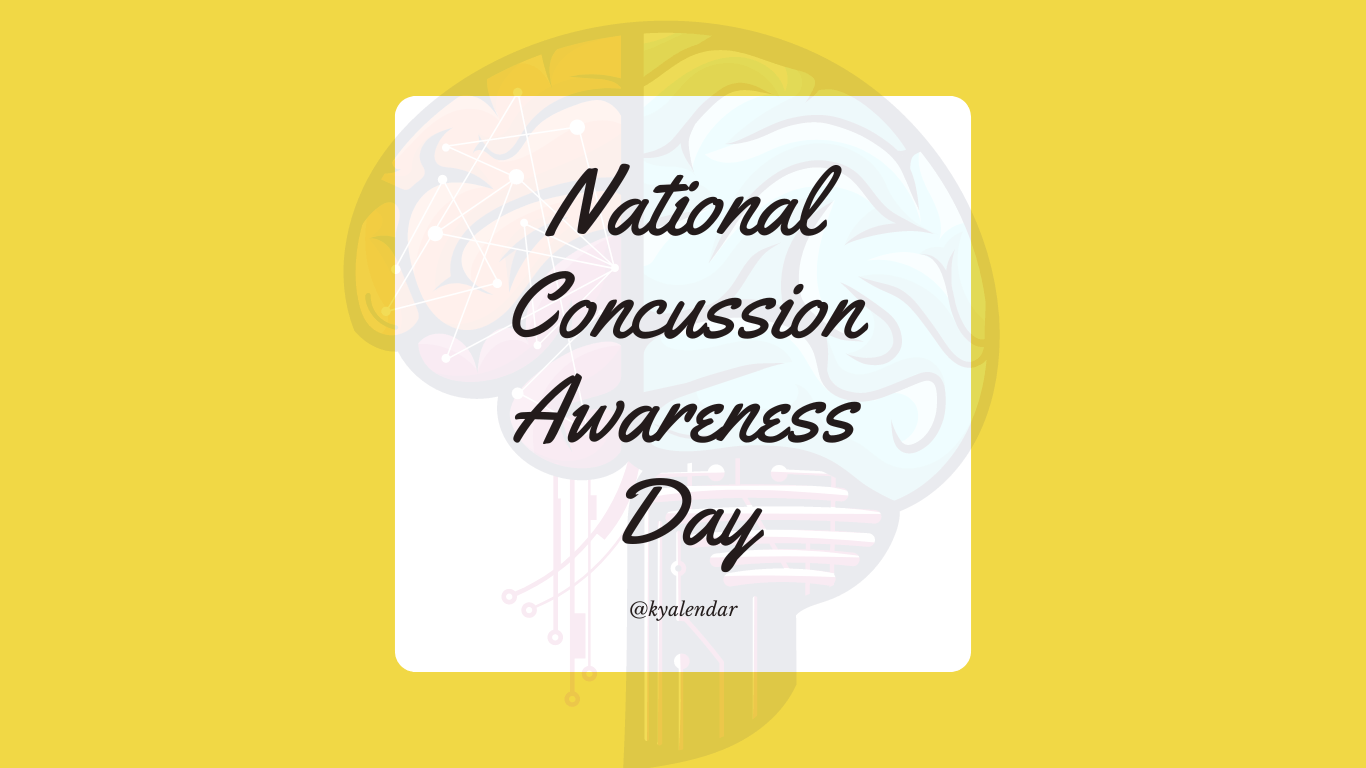
- This event has passed.
National Concussion Awareness Day
September 20

National Concussion Awareness Day, observed annually, is a significant occasion dedicated to increasing awareness about concussions and their impact on individuals’ health and well-being. This day aims to educate the public, raise awareness about prevention strategies, and advocate for effective management of concussions.
Understanding Concussions
A concussion is a type of traumatic brain injury (TBI) caused by a blow or jolt to the head or body that results in the brain moving rapidly within the skull. This sudden movement can disrupt normal brain function, leading to a range of symptoms and potential complications. Concussions are commonly associated with contact sports but can occur in any situation where there is a risk of head injury, such as falls, accidents, or physical altercations.
Signs and Symptoms
Recognising the signs and symptoms of a concussion is crucial for prompt diagnosis and treatment. Symptoms can vary from person to person and may not always be immediately apparent. Common signs and symptoms of a concussion include:
- Headache: Persistent or worsening headache is a common symptom following a concussion.
- Dizziness and Balance Issues: Individuals may experience feelings of dizziness, unsteadiness, or difficulty maintaining balance.
- Nausea and Vomiting: Feeling nauseated or vomiting can occur, particularly shortly after the injury.
- Confusion and Disorientation: Difficulty concentrating, confusion, or feeling disoriented are frequent cognitive symptoms.
- Sensitivity to Light and Noise: Increased sensitivity to bright lights and loud noises can be bothersome.
- Fatigue and Sleep Disturbances: Feeling unusually tired or experiencing changes in sleep patterns, such as difficulty falling asleep or sleeping more than usual, are common.
Prevention Strategies
Preventing concussions is an essential aspect of reducing the incidence and impact of these injuries. Several strategies can help minimise the risk of concussion:
- Proper Safety Gear: In contact sports and activities, wearing appropriate safety equipment, such as helmets and mouthguards, can reduce the risk of head injuries.
- Adhering to Rules and Regulations: Following safety guidelines and rules in sports and recreational activities helps to mitigate the risk of concussion.
- Education and Training: Educating athletes, coaches, and parents about the signs of concussion and the importance of proper technique can contribute to prevention efforts.
- Safe Practices: Encouraging safe practices in everyday activities and sports can help prevent accidents that might lead to concussions.
Treatment and Management
If a concussion is suspected, it is crucial to seek medical attention promptly. Proper management of a concussion involves several key steps:
- Rest and Recovery: Rest is essential for the brain to heal. This includes both physical rest and cognitive rest, which involves avoiding activities that require intense concentration or mental effort.
- Gradual Return to Activities: Following a period of rest, individuals should gradually return to their normal activities under the guidance of a healthcare professional. This process involves a step-by-step approach to ensure that symptoms do not worsen.
- Monitoring Symptoms: Regular monitoring of symptoms is important to ensure that there are no persistent or worsening issues. If symptoms persist or new symptoms develop, further medical evaluation may be necessary.
- Avoiding Further Injury: Individuals recovering from a concussion should avoid situations where they may be at risk of sustaining another head injury.
Raising Awareness
National Concussion Awareness Day serves as a platform to educate the public about the importance of concussion awareness and management. Various activities and initiatives may take place on this day to promote understanding and encourage positive changes:
- Educational Campaigns: Campaigns may include information sessions, workshops, and presentations to inform individuals about the nature of concussions, their symptoms, and prevention strategies.
- Community Events: Community events, such as health fairs or sports events, may feature activities that highlight concussion awareness and offer resources for those seeking more information.
- Social Media and Outreach: Leveraging social media platforms to share information, personal stories, and resources can help reach a broader audience and foster a culture of awareness and prevention.
The Role of Support Systems
Supporting individuals who have experienced a concussion involves more than just medical treatment. Family, friends, and caregivers play a crucial role in the recovery process:
- Emotional Support: Providing emotional support and understanding can help individuals cope with the challenges of concussion recovery.
- Encouragement: Encouraging adherence to medical advice and supporting gradual return to normal activities can aid in a successful recovery.
- Awareness: Raising awareness within families and communities about the signs and importance of managing concussions can contribute to better outcomes for those affected.
Conclusion
National Concussion Awareness Day is an important occasion to focus on the prevention, recognition, and management of concussions. By increasing awareness, educating the public, and promoting safe practices, we can help reduce the incidence of concussions and support those affected in their recovery. This day serves as a reminder of the importance of safeguarding brain health and ensuring that concussions are taken seriously, with appropriate measures in place to support affected individuals.